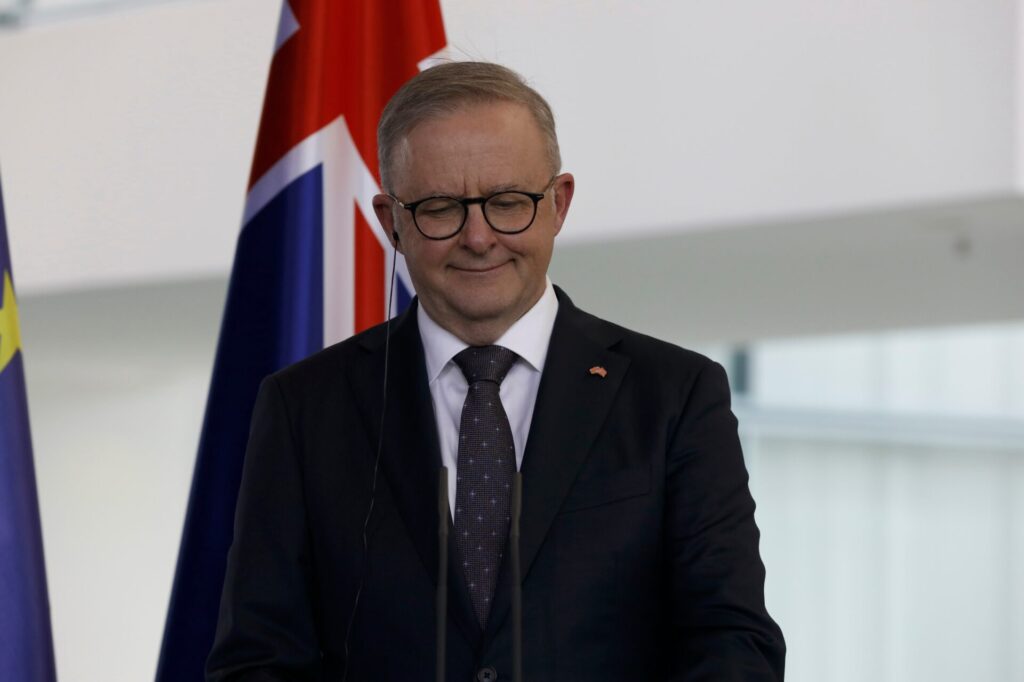The Australian government unveiled [1] legislation on Thursday to set a minimum age limit of 16 for social media use, placing responsibility on platforms to enforce compliance.
This legislation, described by Prime Minister Anthony Albanese as “world-leading,” will be introduced to Parliament during its final session starting November 18.

If passed, the age limit would take effect a year later, giving platforms like X (formerly Twitter), TikTok, Instagram, and Facebook time to devise methods to restrict access for users under 16.
“Social media is doing harm to our kids and I’m calling time on it,” Albanese stated, emphasizing the importance of child safety online. “I’ve spoken to thousands of parents, grandparents, aunties, and uncles. They, like me, are worried sick about the safety of our kids online.” Albanese clarified that the legislation would place the onus solely on social media companies, with penalties for non-compliance.
However, neither children nor parents would face penalties. “The onus will be on social media platforms to demonstrate they are taking reasonable steps to prevent access. The onus won’t be on parents or young people,” he said.
Australia Prime Minister Anthony Albanese said the government would legislate for a ban on social media for children under the age of 16, a policy the government says is world-leading https://t.co/lSw3mOv8b6 [2] pic.twitter.com/nNymp6dqfG [3]
— Reuters (@Reuters) November 7, 2024 [4]
The announcement has sparked diverse reactions within the technology sector. Meta, which owns Facebook and Instagram, stated it would comply with any age limits Australia sets.
Antigone Davis, Meta’s head of safety, expressed concerns about the broader implementation of such restrictions. “What’s missing is a deeper discussion on how we implement protections, otherwise we risk making ourselves feel better, like we have taken action, but teens and parents will not find themselves in a better place,” Davis said.
She also advocated for improved tools within app stores and operating systems, which she argued would allow parents to better control which apps their children can access.
Other social media platforms have responded cautiously. While X declined to comment, TikTok withheld a statement regarding the legislation.
The Digital Industry Group Inc. (DIGI), an Australian digital industry advocacy group, criticized the age restriction as an outdated approach to modern issues. “Rather than blocking access through bans, we need to take a balanced approach to create age-appropriate spaces, build digital literacy, and protect young people from online harm,” said DIGI’s managing director Sunita Bose.
Concerns about the potential effects of a social media age limit were also voiced by mental health and child welfare experts.
Over 140 academics specializing in technology and child welfare issued an open letter to Albanese last month, cautioning that a strict age limit might not effectively address risks. Jackie Hallan, a director at youth mental health organization ReachOut, echoed these concerns, noting that 73% of young people in Australia access mental health support through social media.
“We’re uncomfortable with the ban. We think young people are likely to circumvent a ban, and our concern is that it really drives the behavior underground. If things go wrong, young people are less likely to get support from parents and carers because they’re worried about getting in trouble.” – Jackie Hallan
Some experts suggested a lower age limit might be more practical. Child psychologist Philip Tam noted, “A minimum age of 12 or 13 would have been more enforceable. My real fear honestly is that the problem of social media will simply be driven underground.”
Associate Professor Faith Gordon, a legal expert at the Australian National University, expressed concerns that restricting social media access could create pressures within families.
Prime Minister Albanese stated that the legislation would allow certain exceptions, such as continued access to educational services, but that parental consent alone would not enable access to social media for children under 16.
Earlier this year, the government began a pilot program testing age-restriction technologies, which will guide social media companies on reasonable compliance measures.
The Australian eSafety Commissioner, tasked with enforcing the new rules, will oversee these guidelines.
Communications Minister Michelle Rowland emphasized the importance of penalties to ensure compliance, stating, “There does need to be enhanced penalties to ensure compliance. Every company that operates in Australia, whether domiciled here or otherwise, is expected and must comply with Australian law or face the consequences.”
The opposition party has offered tentative support for the legislation.
Opposition lawmaker Paul Fletcher noted that social media platforms already possess the technology to enforce age restrictions.
“It’s not really a technical viability question; it’s a question of their readiness to do it and will they incur the cost to do it,” Fletcher remarked, adding that with firm legislation, “you can get the outcomes.”
The age limit proposal reflects a global trend as governments seek ways to manage the impact of social media on youth.
If passed, Australia’s legislation would make it one of the first countries to impose such a national restriction, aimed at protecting younger users while balancing technological and social concerns.